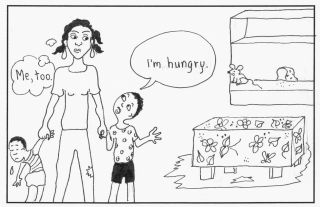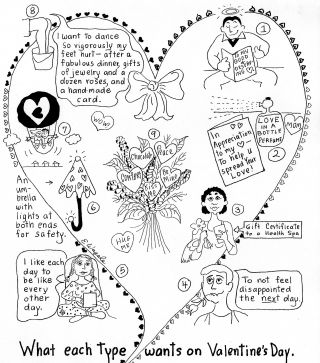
Family Dynamics
Concrete Cases of Poverty in America
Down-to-Earth Examples (Plus Enneagram Valentine to Enjoy)
Posted February 12, 2013

Not enough to eat by Elizabeth Wagele
In my last blog on Psychology Today, I talked about the relationship of poverty to neurology and how the stress of poverty can harm the delicate prefrontal cortex in growing children. Obviously, we should be trying harder to alleviate poverty in our country. As soon as I say that, however, I think of the children all over the world who are starving. Who can stand to see children in other countries suffer the stresses of poverty either? We need to create enough jobs and incomes here, wars need to cease and money has to shift from ill uses to good uses, right? We have huge problems to solve and neither enough brains nor methods to solve them. So we must need to try harder.
Meanwhile, I would like to bring this problem more down to Earth with some concrete examples of what it’s like to go hungry here:
1. Jesse is a teenager. As other families choose between colleges, hers must choose between medical care and welfare. Jesse assumes the role of the caretaker in her family. The oldest of three children, she must look after her siblings while her father ekes out a living driving a truck. His 12- to 15-hour shifts don’t provide enough income to pay the bills. She begins her days early, after her father leaves for work. She wakes up her brother and sister, feeds them and sends them to school. After attending classes all day, fixes dinner, helps her siblings with class assignments and puts them to bed before starting her own homework. Although the family isn’t homeless, they have $120 each month to buy food. Often, there isn’t enough to last the month, so Jessie is forced to turn to charities for help. Her family suffers from the struggle to make ends meet. Jessie’s father has a heart condition and struggles against obesity. Jessie’s dream of going to college is tempered by fears that her father will need her close to home as he faces growing health problems.
2. J.R.’s life changed when his mother became ill and his father had a stroke. Before his parents’ illnesses, they had all lived together in a small rented apartment. His mother’s poor health forced his dad out of work. When her condition worsened and she moved into a nursing home, J.R. said, “The happiness slowly just went away.” Soon after, he and his father lost their apartment and J.R. entered his first homeless shelter at the age of 4. Over the next 11 years, the family went through 14 different homeless shelters. In one year, J.R. switched high schools three times. Homelessness has taken a toll on J.R.’s emotional health. “I feel like my childhood was taken away from me,” J.R. noted. “I was neglected in my childhood because I was constantly moving. I was in another shelter and another shelter, another shelter.” J.R. felt isolated from other teenagers and at times considered suicide.
3. Elizabeth grew up in a small housing project. “My father suffered from alcoholism. Our neighborhood was incredibly dangerous and violent. In order to get out of the projects our family moved into a partially condemned apartment building that had no running hot water, faulty electricity and ‘furry guests.'
I constantly worried about my siblings because I knew they hadn't eaten the night before. I started babysitting at a young age and used my income to buy them food. I’d buy a sub sandwich and cut in 3 pieces to feed them and me.”

Happy Valentine's Day by Elizabeth Wagele
For types of famous people, books, essays, cartoons, and more see wagele.com.

